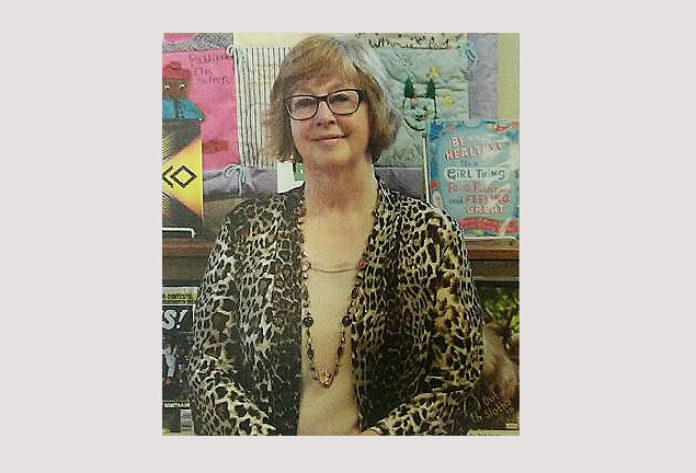When Helen Leinbach and her family moved to northern Indiana 28 years ago, she had no idea that she’d spend more than a quarter century surrounded by books and become known as the town librarian.
But she did, and on Saturday she’ll be honored as North Webster’s Citizen of the Year during the annual Mermaid Festival parade.
Like a book that makes a quiet impact chapter by chapter, Leinbach has spent 27 years as director of the library, sinking her teeth into the community and helping grow the facility into a hub of activity.
Her outlook about libraries is simple. She views them as a delightful place for children, one that is welcoming and levels the playing field in terms of access for everyone.
“I’ve always loved libraries,” she said.
Leinbach has gained the reputation as a caring, compassionate leader who is good with names and has worked hard to connect with residents to promote the library and make it a vital part of the town, says Pam Long, the youth services librarian.
“I’ve worked in libraries for 30 years and I’ve never had a director who cares that much about the community,” Long said.
The Leinbach family, with three kids in tow, moved from Gaithersburg, Md., to Indiana in 1989 when Leinbach’s husband, Alan, took a job in Goshen. They chose to live in North Webster, and Leinbach soon found herself gravitating toward the little independent library housed in a small building two blocks off of Ind. 13 that also housed the Tippecanoe Township offices.
While visiting, she heard the librarian planned to quit soon and instantly took an interest in the opening. Within a few months, she landed the job and began a 27-year career.
When she took over the library, Leinbach oversaw it with the help of one volunteer who worked about 12 hours a week. The annual budget, she recalls, was $12,000 and supported equally by the town and Tippecanoe Township.
The library consisted of about 15,000 items fits snugly into a 1,300-square-foot area. “We had a lot crammed into that little building, but there was only so much you could cram into it,” Leinbach recalled.
Acquiring “new” books was often done through Goodwill.
“I started at $5 an hour, so it was truly a labor of love,” Leinbach said.
In 2004, the library moved into the community center that once had been a school. Leinbach began exploring how to shift its status from independent to public, a move that would allow the facility to establish its own tax levy that would supply a revenue fund to support further growth.
At the time, though, state law required public libraries to have a township population of at least 10,000. Tippecanoe’s population was far below that.
But through some research, they discovered a loophole that would allow libraries to become public if the township’s assessed property value could match that of townships with a population of 10,000.
As it turns out, the numerous lake properties on the Barbee chain, Webster Lake and Tippecanoe Lake helped boost the assessed value far beyond the necessary level, and within months, the township took action to make the switch, Leinbach said.
While it took nearly two years to be certified, the change paid off. The library eventually saw its budget rise from $35,000 to about $300,000, Leinbach said.
That move allowed the library to start buying books, hiring staff and planning for a much bigger future.
Today, Leinbach has a staff of 15, including six full-time employees who oversee 56,000 items, including audiobooks and DVDs, plus about 100,000 items available through ebooks and audiotapes that can be downloaded.
On top of that, they have established about 30 databases that open the door to learning about subjects ranging from genealogy to travel.
An entire room has been dedicated to local history, and the genealogy and children’s sections have been expanded significantly in the past 10 years.
They’ve also digitized more than 10 years of yearbooks for Wawasee Community Schools.
“Day to day, you’re not so aware of the changes, but when I look back 27 years ago, it’s rather startling how many changes there have been. We’ve come a long way.”
The library also has become a center of activity.
This summer, 300 kids have registered for a summer reading program, and staffers organize four or five programs each for adults and children per week. A children’s bingo event last week attracted 102 participants.
Leinbach credits much of the traffic to local folks who still find value in the facility.
“We’re very, very blessed to be in the community that we’re in,” she said.
Leinbach is reflective about the role of the library. She said the biggest challenge is keeping up with technology and finding ways to ensure the library remains relevant.
“A lot of people have suggested that the day of the public library is over because people don’t need books for reference or need books to read, but I would suggest that with our circulation of about 100,000 items a year, people are still reading.”
While the offerings have grown immensely, the facility is small compared to many others. But it seems to think big.
“We offer as many programs as most very large libraries,” Leinbach said.
It’s no mystery that her career was spurred by a love of reading, and that also extended to her children.
“I read to them all the time when they were children. I think reading made one of the biggest differences,” she said.
Her daughter, Betsy, is working on a master’s degree. Son Mark is an administrator at a mental health facility in Ohio, and her oldest son, Andy, works as a librarian at the Beverly Hills Public Library in California.
“Our family tradition is continuing,” she said.





